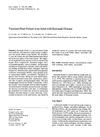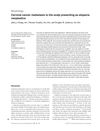1 citations,
January 2022 in “Journal of Cancer Therapy” Ocoxin improves quality of life for advanced ovarian cancer patients on chemotherapy.
May 2024 in “Journal of Fungi” Tinea capitis in adults, especially postmenopausal Black women, needs prompt treatment with oral antifungals to avoid scarring.
[object Object] March 2024 in “Veterinary sciences” Geriatric Julia Creek dunnarts often suffer from reproductive and skin diseases, impacting conservation efforts.
 13 citations,
March 1986 in “Clinical Cardiology”
13 citations,
March 1986 in “Clinical Cardiology” An adult with Kawasaki disease experienced temporary heart failure but recovered without lasting heart damage.
 218 citations,
April 2012 in “British Journal of Dermatology”
218 citations,
April 2012 in “British Journal of Dermatology” Guidelines suggest various treatments for alopecia areata, but leaving it untreated is also an option as 80% cases may recover on their own.
 2 citations,
October 2015 in “Primary Care: Clinics in Office Practice”
2 citations,
October 2015 in “Primary Care: Clinics in Office Practice” Doctors should diagnose hair loss by examining the patient and possibly doing tests, and then treat it based on the type, which may prevent permanent hair loss.
 2 citations,
September 2011 in “Pediatric Dermatology”
2 citations,
September 2011 in “Pediatric Dermatology” The document suggests there might be a link between Kawasaki Disease and Alopecia Areata that needs more research.
 1 citations,
January 2015 in “Springer eBooks”
1 citations,
January 2015 in “Springer eBooks” The document says a skin condition called alopecia areata causes hair loss and stress, and is treated with strong skin creams, injections, or other therapies, but treatment success varies.
 34 citations,
April 2009 in “Expert Opinion on Pharmacotherapy”
34 citations,
April 2009 in “Expert Opinion on Pharmacotherapy” Some treatments work for common baldness, but there's less evidence for other hair loss types, and more research is needed.
 May 2017 in “InTech eBooks”
May 2017 in “InTech eBooks” Some hair loss disorders cause permanent loss due to scarring, and treatments like steroids don't always work well.
 September 2003 in “Current Paediatrics”
September 2003 in “Current Paediatrics” The document concludes that accurate diagnosis and understanding the type of hair disorder are crucial for treating hair loss in children.
 December 2018 in “Neuroradiology”
December 2018 in “Neuroradiology” MRI helps distinguish between pituitary adenomas and craniopharyngiomas, guides treatment for pediatric CNS tumors, and assesses rhinocerebral mucormycosis with a high mortality rate in transplanted patients.
 April 2024 in “International Journal of Research Publication and Reviews”
April 2024 in “International Journal of Research Publication and Reviews” Alopecia areata causes hair loss with varied treatment responses and frequent relapses.
 33 citations,
November 2012 in “JAMA Dermatology”
33 citations,
November 2012 in “JAMA Dermatology” Most women with weird scalp feelings had neck spine problems, and some got better with gabapentin treatment.
 24 citations,
February 2007 in “International Journal of Dermatology”
24 citations,
February 2007 in “International Journal of Dermatology” A woman with cervical cancer had rare scalp metastasis causing a unique type of hair loss.
 20 citations,
June 2012 in “Human Reproduction”
20 citations,
June 2012 in “Human Reproduction” Women with polycystic ovarian syndrome are more likely to have cervical insufficiency, especially South Asian and Black women.
 9 citations,
May 2019 in “Experimental Cell Research”
9 citations,
May 2019 in “Experimental Cell Research” HPV genes and estradiol increase a cancer-related signaling pathway, which may be targeted for cervical cancer treatment.
 5 citations,
June 2019 in “JAAD Case Reports”
5 citations,
June 2019 in “JAAD Case Reports” Imiquimod used intravaginally for cervical issues can cause temporary hair loss, especially if severe side effects occur.
 3 citations,
August 2020 in “Journal of The American Academy of Dermatology”
3 citations,
August 2020 in “Journal of The American Academy of Dermatology” Degenerative changes in the lower cervical spine are common in patients with abnormal scalp sensations, with some improvement seen using pain medication and physical therapy.
 2 citations,
September 2022 in “Cellular and molecular biology”
2 citations,
September 2022 in “Cellular and molecular biology” Agaricus bisporus derived β-Glucan could be an effective cervical cancer treatment with antimicrobial and antioxidant properties.
1 citations,
January 2023 in “Journal of Obstetrics and Gynaecology” High DHEA and short cervical length in women with PCOS and recurrent miscarriages may harm pregnancy outcomes.
 February 2009 in “Journal of The American Academy of Dermatology”
February 2009 in “Journal of The American Academy of Dermatology” Fractional infrared technology is effective and safe for treating cervical laxity.
 October 2024 in “Journal of the Endocrine Society”
October 2024 in “Journal of the Endocrine Society” Metastatic cervical cancer can cause rare, severe Cushing's syndrome with high risk of death.
 October 2020 in “International Journal of Medical Arts (Print)”
October 2020 in “International Journal of Medical Arts (Print)” The PEEK cage reduced pain more than the dynamic cervical implant, but the implant allowed slightly better movement after surgery.
 2 citations,
July 2023 in “Obstetrics & Gynecology”
2 citations,
July 2023 in “Obstetrics & Gynecology” Imiquimod may be a better non-surgical treatment for cervical pre-cancer, but its effectiveness for vaginal pre-cancer is unclear, and it has some side effects.
[object Object]  43 citations,
February 2020 in “Clinica chimica acta”
43 citations,
February 2020 in “Clinica chimica acta” Nano-sized plant-based chemicals could improve cervical cancer treatment by being more effective and causing fewer side effects than current methods.
 1 citations,
January 2020 in “Research Square (Research Square)”
1 citations,
January 2020 in “Research Square (Research Square)” Banana (Musa × paradisiaca) may help fight cervical cancer and skin cancer.
 January 2022 in “European Journal of Gynaecological Oncology”
January 2022 in “European Journal of Gynaecological Oncology” Topical imiquimod use for treating a cervical lesion might cause delayed hair loss.
 October 2024 in “Journal of the Endocrine Society”
October 2024 in “Journal of the Endocrine Society” ACTH-dependent Cushing's syndrome linked to metastatic cervical cancer is rare and has high risks.
 February 2009 in “Journal of The American Academy of Dermatology”
February 2009 in “Journal of The American Academy of Dermatology” Fractional infrared technology is effective and safe for treating cervical laxity.

























